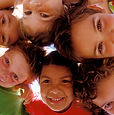
Curriculum
The children are helped to develop their potential at their own pace. Using the Key Person system helps us to plan a curriculum to suit each individual child. With the use of our resources, staff and equipment, a developmental programme of play activities enables the children to progress.
As the first educators of your child, we welcome your input to the planning process for your child. You can do this through observations of your child’s achievements and interests whilst they are with you.
These can be fed back to your childs key person orally, in written form or by uploading videos and photos onto our online learning journal on Tapestry. These will be added to your child’s profile and assessed by the key person.
All children follow the Early Years Foundation Stage document and this lasts throughout the Foundation Stage. This prepares them for the National Curriculum, which begins at Year 1 in primary school. Attention is also given to the Every Child Matters document when delivering the curriculum to all.
The three prime areas are:-

personal social & emotional
Within a supportive environment the children develop confidence, self-reliance and self-respect. They are encouraged to work and concentrate independently and also to take part in the life of the group, sharing and co-operating with other children and adults. Through activities, conversation and practical example, they learn acceptable ways to express their own feelings and to have respect for the feelings of others. All children are given the opportunity, as appropriate, to take responsibility for themselves and also for the group, its members and its property.

communication & language
Children are encouraged, in both small and large groups, to extend their vocabulary and fluency by talking and listening, and by hearing and responding to stories, songs and rhymes.

physical development
A range of equipment and opportunities, both indoors and out of doors, allows children to develop confidence and enjoyment in the use and development of their own bodily skills. A high level of adult supervision enables children safely to create and meet physical challenges, developing increasing skill and control in moving, climbing and balancing. Children also develop their fine motor skills using crayons, pencils , etc., enabling them to handle small objects with increasing control and precision. Also encouraged to develop awareness of their own bodies and what keeps them healthy.
with secondary areas being:-

Literacy - reading - writing

Mathematics
Children have opportunities to join in with rhyming and rhythmic activities daily. They are helped to understand that written symbols carry meaning, to be aware of the purposes of writing and when they are ready to use drawn and written symbols for themselves. A well-stocked book corner gives each child the opportunity and encouragement to become familiar with books, able to handle them and be aware of their uses, both for references and as a source of stories and pictures.

Expressive arts and
design
Children are encouraged to use a wide range of resources to express their own ideas and feelings and to construct their individual response to experience in two and three dimensions. Paint, glue, crayons and pencils as well as natural and discarded resources, provides for open-ended exploration of colour, shape, sound and texture and the development of skills in painting, drawing and collage. Children join in with and respond to music and stories, and there are many opportunities for imaginative role play, both individually and as part of a group.
By means of adult supported practical experience, children become familiar with the sorting, matching, ordering, sequencing and counting activities form the basis for early mathematics. As they use their developing mathematical understanding to solve practical problems, children are assisted to learn and use the vocabulary of mathematics, identifying objects by shape, position, size, volume and number. Songs, games and picture books help children become aware of number sequences and when they are ready to use simple mathematical operations such as addition.

Understanding of the world
A safe and stimulating environment allows children to explore and experiment with a range of natural and manufactured materials. They learn to observe the features of objects and substances, recognising differences, patterns and similarities, and to share and record their findings. Children are assisted in exploring and understanding their environment, both within the group and also in the wider community. A range of safe and well maintained equipment enables children to extend their technological understanding, using simple tools and techniques as appropriate to achieve their intentions to solve problems. They learn to respect other people, and expect to be respected for themselves.
This is achieved in accordance with the guidelines provided by the Department for Education - documents are available from www.Direct.gov.uk – Early years Foundation stage, or from the setting.
Grouping of children
During the sessions, the children will have the opportunity to work and play in various size groups depending on the activity involved. The correct adult child ratio is maintained at all times across the setting. Large group activities will include but not limited to
.general story time,
.song, and rhyme time
Small group activities will include
Activities where children are using sharp tools for example, Hammers, scissors, and knives for cutting
Activities such as language, enrichment groups, Focus support groups
Adult lead activities will be delivered in smaller groups, depending on the activity and the age and ability of the child involved. Every session includes free, flow flow, giving children time to choose their own activities and playmates. For the sake of safety the number of children at any one particular activity may be restricted e.g. home corner. With time this becomes self regulatory. As the structure of the groups changes during FreeFlow play the staff positioning
changes to meet these needs.


